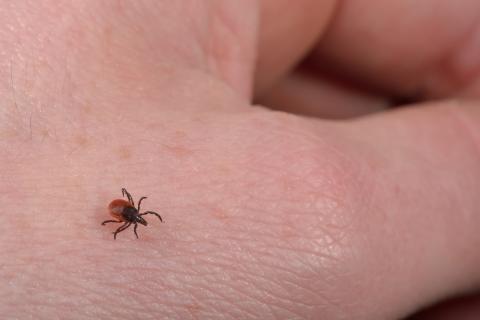About Borrelia miyamotoi
Borrelia miyamotoi is a species of bacteria spread by ticks. It can cause illness in humans, but it’s rare in Wisconsin. It is spread by the deer tick, also known as the black-legged tick. This is the same tick that spreads many other diseases, including Lyme disease.
B. miyamotoi was first known to cause human illness in 2011. The first case of B. miyamotoi disease in a Wisconsin resident was reported in 2016. Since it’s a relatively new disease, doctors and scientists are still learning about it.
B. miyamotoi infections occur most often in places where Lyme disease is common. These areas include the Upper Midwest (including Wisconsin), the Northeast, and the mid-Atlantic states. In Wisconsin, cases of B. miyamotoi are most common during June, July, and August.
Anyone can get B. miyamotoi. People who spend more time outdoors are at higher risk of being bitten by an infected tick. Deer ticks usually are found in areas with woods, brush, or tall grass.
In Wisconsin, deer ticks are most active from May to November, but it’s important to use caution year-round.
Protect yourself with Tick Bite Prevention
Borrelia miyamotoi 101
B. miyamotoi spreads to humans through the bite of an infected deer tick. Immature ticks, adult ticks, and larval ticks can spread the infection.
To keep from getting sick, it’s important to remove ticks as soon as you find them. A tick can likely spread B. miyamotoi within the first 24 hours of being attached to a human.
Most people are infected by immature ticks, called nymphs. Nymphs are very small, about the size of a poppy seed. They’re hard to see, and most people don’t feel their bites. This makes them harder to remove right away. Nymphs are most active during the spring and early summer.
Adult ticks also spread B. miyamotoi. Adults are larger than nymphs, about the size of a sesame seed. They’re more likely to be found and removed before the bacteria spread to the person. Adult ticks are most active during the cooler months of spring and fall.
B. miyamotoi also may be spread by larval ticks. Larval ticks are even smaller than nymphs. It’s very unlikely that you’ll notice a larval tick. Larval ticks are most active in summer and fall.
Ticks can attach to any part of the body. They often are found in hard-to-see areas, such as:
- Behind the knees.
- In the armpits.
- On the scalp.
- In and around the ears.
- Inside the belly button.
- On the groin.
B. miyamotoi is preventable and treatable. Learn about Tick Bite Prevention and how to properly move a tick if you’re bitten.
Symptoms can show up three days to six weeks after being bitten by an infected tick.
So far, most people with B. miyamotoi disease have reported these signs and symptoms:
- Fever, sometimes recurring
- Chills
- Fatigue
- Severe headache
- Muscle aches
- Joint pain
Serious illness affecting the brain, such as inflammation of the brain and the surrounding membranes (meningoencephalitis), has also been reported.
B. miyamotoi can be successfully treated with a two- to four-week course of the antibiotic doxycycline. Amoxicillin and ceftriaxone also have been successfully used.
Begin treatment as soon as possible after symptoms start.
Resources from the Wisconsin Department of Health Services (DHS)
- Education on the risk posed by illnesses spread by ticks—Tickborne Diseases Risk in Wisconsin, P-01751 (PDF)
- Educational tri-fold card about ticks in Wisconsin, proper removal, and tick bite prevention—Tick Safety Guide, P-01434 (PDF)
- Fact sheet with simple steps to take—Protecting Your Family from Mosquitoes and Ticks, P-02080 (PDF)
Resources from the CDC (Centers for Disease Control and Prevention)
- Plastic trail sign to remind hikers there are ticks in the area—Prevent Tick Bites. Order the sign from CDC Info on Demand.
- Educational comic for kids—Don't Let a Tick Make You Sick - Comic (PDF).
- Educational crossword for kids—Don't Let a Tick Make You Sick - Crossword (PDF).
Partner resources
- Information from the University of Wisconsin-Madison Medical Entomology Laboratory—Wisconsin Ticks and Tick-borne Diseases
- Information on ticks found in the Midwest, surveillance resources, and tick biology and development from the Midwest Center of Excellence for Vector-Borne Diseases—Midwest Center of Excellence for Vector-borne Disease Ticks. (Sign in required.)
Contact us
Questions about illnesses spread by ticks? We’re here to help.
Bureau of Communicable Diseases
Phone: 608-267-9003
Fax: 608-261-4976


